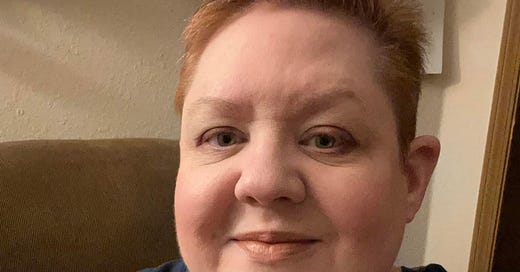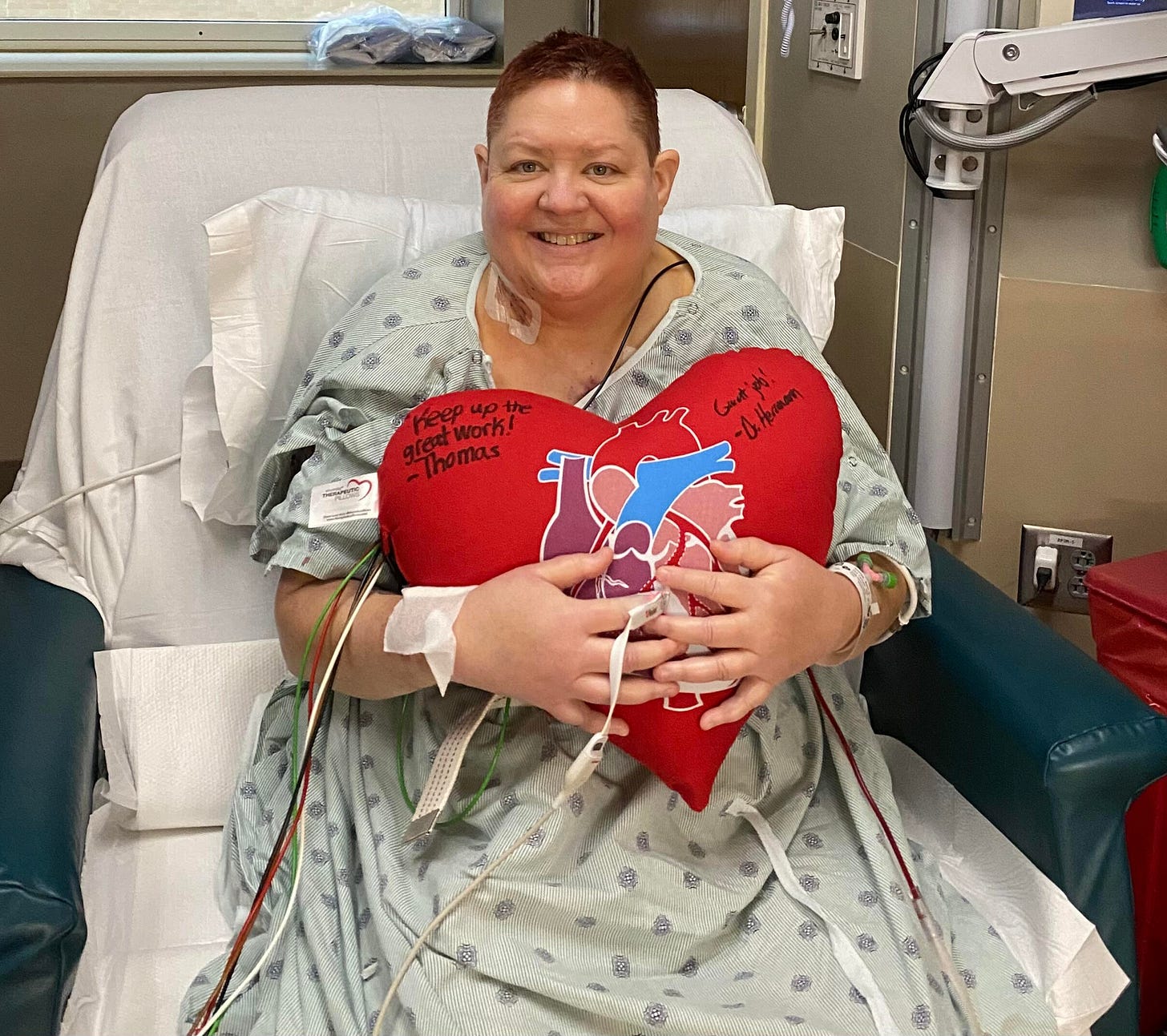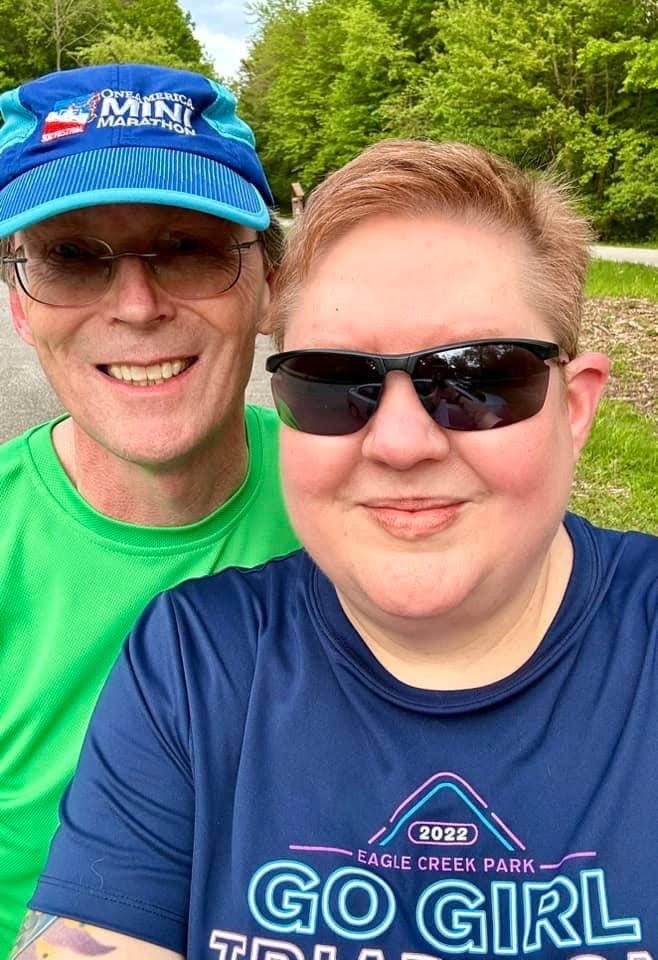“I just appreciate the fact that I'm here.”
At age 51, Beth Gootee learned she had been born with a critical heart condition. A whirlwind of tests and cardiac surgery followed.
Welcome! This is The Heart Dialogues, a free newsletter for people born with heart conditions (and the people who care about them). Join this community by adding your email below. Every other week, you’ll get an edition in your inbox with candid conversations, essays, links, recommendations, reader threads and other good stuff about what it’s really like to live with a weird and special heart.
I can’t imagine a life without my heart defect. I was diagnosed at 5 days old, and my heart surgeries all happened before the age of 4. I have a whisper of a memory or two from those surgeries, plus scars that have been with me for as long as I can remember.
This is a pretty typical story—an early diagnosis, childhood operations, a lifetime of paying attention to one’s bum ticker. Some people, however, don’t discover their inborn cardiac issues until much later. (See: Bronny James, the 18-year-old son of NBA star LeBron James, whose family said last week that he had been diagnosed with a congenital heart defect; he had suffered cardiac arrest during a July basketball practice.)
Indianapolis native Beth Gootee learned about her serious congenital heart condition when she was 51 years old. Beth, now 53, works as a senior administrative assistant for a pharmaceutical company. She said she started feeling tired toward the end of 2020. Eventually, her cardiologist discovered that she had a primum atrial septal defect, a hole in the lower part of the atrial septum, or the wall between the two upper chambers of the heart. She also learned that another issue with her heart—what she came to understand was a partial atrioventricular canal defect, another type of hole in the heart—had been present at birth.
The diagnosis left Beth speechless. What followed was a cascade of tests, an open heart surgery in December, recovery and a new way of thinking about her life and her health.
Read on for Beth’s story.
You said you had been seeing a regular cardiologist for a heart murmur for almost seven years. He said you had mitral valve stenosis, or a narrowing of the mitral valve, and an outflow tract obstruction, or obstructed blood flow. Things started to change at the end of 2020. How did you learn you had a more serious congenital heart condition?
I mentioned to him that I noticed that I'm kind of out of breath, and I'm feeling really fatigued, which just doesn't seem normal to me. I had had a surgery for hysterectomy that hadn't really gone well, and I had a rough recovery. So I figured it was just that. I didn't think anything of it until, throughout 2021, I'm getting more tired, going upstairs is a lot harder. Okay, this still doesn't feel right. So I mentioned it to him. He said, “Keep an eye on it.” When I saw him in 2022, I looked at him and said, “I can't even go half a flight of stairs. If I walk across the room and sit down in the chair, I'm out cold for two hours. This is not normal.” He goes, “Yeah, let's take a look.” So he did an echocardiogram [and other tests], and he said, “There's an issue.” And I'm like, “Oh.” “I think you have a hole in your heart and it may have something to do with your congenital defect.” I'm like, “What congenital defect?” [laughs]
And so, trying to make a really long story short, I was diagnosed in February of 2022 that I did have a hole in my heart, a primum atrial septal defect, and along with that, the congenital heart defect that I finally [learned more] about, a partial atrioventricular canal defect. Because of that, my ventricles have had to work harder, and it's likely I had that hole my entire life, but it just didn't open up until I started having some issues with the mitral valve.
You said that you had echos, transesophageal echocardiograms, MRIs and a cardiac catheterization, and you were referred to an adult congenital clinic. And then this past December you had an open heart surgery to fix problems with the mitral valve and the ASD. It sounds like you've had this really accelerated experience—everything I've been having for my whole life packed into less than a year.
I'm also a Type 2 diabetic, so I threw that complication into the mix right away. I am used to taking care of a chronic health condition. This has been an entirely different experience. And yes, it has gone very quickly. At times it's been very hard to process everything. At times I'm very grateful for the team that I have because they've explained everything. I'm one who likes to dig into things to find out a little bit of history about this or that. I've done a little bit of reading, some research. My sister had a congenital heart defect, also repaired later, so she was a good resource. I have a very good friend who's dealt with a number of heart issues, congenital and otherwise, and he was very much a very good sounding board for me as I went through this process.
Can you talk more about how you felt getting that diagnosis?
I was speechless. I'm trying to come up with words now. I guess speechless is a good way to describe it. I don't remember exactly what I told [my cardiologist], but I think I said, “You've got to be kidding me.” And then it was like, “What do we do next?” I remember coming home and telling my husband, saying, “I think I have a problem.” And kind of trying to tell him what I had been told, doing a very poor job of it. I didn't know what to think, what to do. I trusted what [my cardiologist] was doing because I knew he cared enough about me that it's like, “Alright, we're going to take care of this.” And I'm like, “Okay, let's go.” That's kind of how it's been. Going through the initial meeting with [my adult congenital cardiologist], going through the echocardiograms, another MRI, another TEE, and then I had a heart cath, it was scary. I asked a lot of questions, and they answered a lot of my questions. It has felt like a roller coaster. I've been lucky that I've had a great team.
How have you been feeling since the surgery in December?
Actually, I [felt better]. A lot of my friends said, “You have color in your face again, you just have color in your cheeks.” They said I looked 100% better. I felt better. Recovery went surprisingly well. At this point, the only real post-complication that I dealt with in the beginning, and still do to this day, is I still have some fluid around my heart that's been a bit stubborn, to put it kindly.
This just sounds really hard. I'm sorry that you've had to go through all this.
There was definitely times it was hard. I had those moments where it was, why me? I already have one chronic health condition [Type 2 diabetes] that I manage pretty well. Why do I have to deal with another one? How do I maintain the balance between the two? There's been some stress involved with that.
Were there any signs when you were little that your heart was different?
Not that I can recall, to be honest. School was a bit of a struggle for me. I was never that athletic kid. I was always the one who had her nose in a book and, quite frankly, still am. In my later adult years, I got into doing 5Ks, and I've done a lot of those. I've done some half marathons. I walk. I like doing outdoor stuff. Swimming is probably my favorite activity to do. But I was never that really athletic kid. I'd go and play with friends and stuff. It was a great childhood.
What has this experience changed in your life?
It has definitely changed the way I think. I pay attention to my health a lot more carefully than I did before. I've made even more changes [health-wise], and I feel better. I've dropped quite a bit of weight. I’m more appreciative of things than I was before. I just appreciate the fact that I'm here. What if this had continued to go undiagnosed? What if I hadn't paid attention to the symptoms? Sometimes there's those what ifs in the back of my head. In a way it's made me become a better diabetic. My diabetes is actually better controlled now than it was prior to my surgery, and I just feel better overall health-wise.
Has it changed your work life at all?
[My supervisor has] made it abundantly clear to me that, “Your health is most important, your job comes second, and however we can support you, we want to do that.” I feel better knowing that I have support.
What else is important to ask about?
I've been very lucky that I have a great medical team. That's vitally important. I know a lot of people may not necessarily have that. And I think having a good support system. My sister was a great support, my friend was a great support, my husband has been a great support to me, and friends as well. I remember when I went back to see my general cardiologist this past February, literally the first words to him were, “Can I give you a hug?” And, “Thank you for listening to me.”
Are there any positives to come out of this very difficult experience?
Yes, it was difficult and it was scary at times. But the fact that I had the great medical team, I had an amazing support system, made it less scary. If someone told me 10 years ago that you would be facing this today, I would do it all over again. It's been a life-changing journey. And I wouldn't change it.
Interview has been condensed and edited.
Did you learn about a congenital heart problem later in life? What was that like? Share your story by hitting the comment button, or send me an email at theheartdialogues@substack.com.







Great story! I can’t imagine getting diagnosed as an adult. Growing up with CHD is just part of life for me. In my case I had years to prepare for my final repair OHS. I had my final corrective surgery at age 13 yrs. I can’t imagine having little to no time to prepare for it.
I still say the real heart warriors are the CHD specialists.❤️ Where would we be today without them?
I’ve know Beth for a few years now, and I’ve never seen a heart patient, bounce back from what she’s had done, as quickly and perfectly, as she has. I’m so proud of her progress, and even more proud to call her, FRIEND.